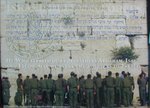Saudis give cautious backing to Bush plan
By Andrew England in Cairo
Published: January 16 2007 17:40 | Last updated: January 16 2007 17:40
Saudi Arabia, a key US ally in the Middle East, on Tuesday gave cautious support to President George W. Bush’s new plan to end the bitter sectarian conflict in Iraq, but said the initiative’s success hinged on the Iraqi administration.
After meeting Condoleezza Rice, US secretary of state, Saud al-Feisal, the Saudi foreign minister, said the kingdom agreed “fully with the goals set by the new strategy” which, if implemented, “would solve the problems that face Iraq”.
However, he added that while other countries could help, “the main responsibility in taking decisions rests on the Iraqis”.
The new US plan includes an increase of 21,500 American troops in Iraq, destined mainly for Baghdad, and increased pressure on Iran, which Washington accuses of supporting Shia groups in Iraq. However, it is highly dependent on the actions of the Iraqi government and rests on the hope that it will adopt policies it has previously resisted.
Ms Rice was in Saudi Arabia – the region’s most powerful Sunni country – as part of a Middle East tour to drum up support for the initiative. She dined with King Abdullah on Monday evening.
Outlining the plan last week, Mr Bush called on Saudi Arabia, Egypt and Jordan, all pro-western Sunni states, to “step up” their support for the Shia-dominated Iraqi administration.
Although Arab officials have questioned Washington’s emphasis on a military, rather than political, solution, they have also been arguing against an abrupt US withdrawal, fearing it would exacerbate Iraq’s civil conflict and destabilise the region.
They have said that to bring some order to Iraq, the Baghdad government must be willing to deal with Shia militias and make political concessions, including am-ending the constitution to give the minority Sunni a greater stake in the country.
“[The Iraq government] must stop the resistance, bring everyone into the political process and realise the hopes of the people,” Mr Feisal said.
Ms Rice said the US would continue to work with the Iraqi government “to make sure the networks running dangerous militias were stopped”.
Sunni nations have also been alarmed both by Shia Iran’s growing influence in the region and its nuclear ambitions.
The day before Ms Rice’s visit to Saudi Arabia, Ali Larijani, Iran’s top security official, held meetings in Riyadh. However, Mr Feisal played down suggestions that his government had been asked to ease tensions between Washington and Tehran.
“There is no need for mediation,” Mr Feisal said. “Our relations with the United States are long standing...Iran is a neighbour of Saudi Arabia, so obviously we hope to avoid any conflict.”
Egypt also appeared to have given its backing to the US plan, with Ahmed Aboul Gheit, the country’s foreign minister, saying on Monday that his government would support the strategy in the hope that it would lead to “the stability, the unity and the cohesion of the Iraqi government”.
Ms Rice was due to meet eight Gulf foreign ministers in Kuwait on Tuesday night.
Copyright The Financial Times Limited 2007

























No comments:
Post a Comment